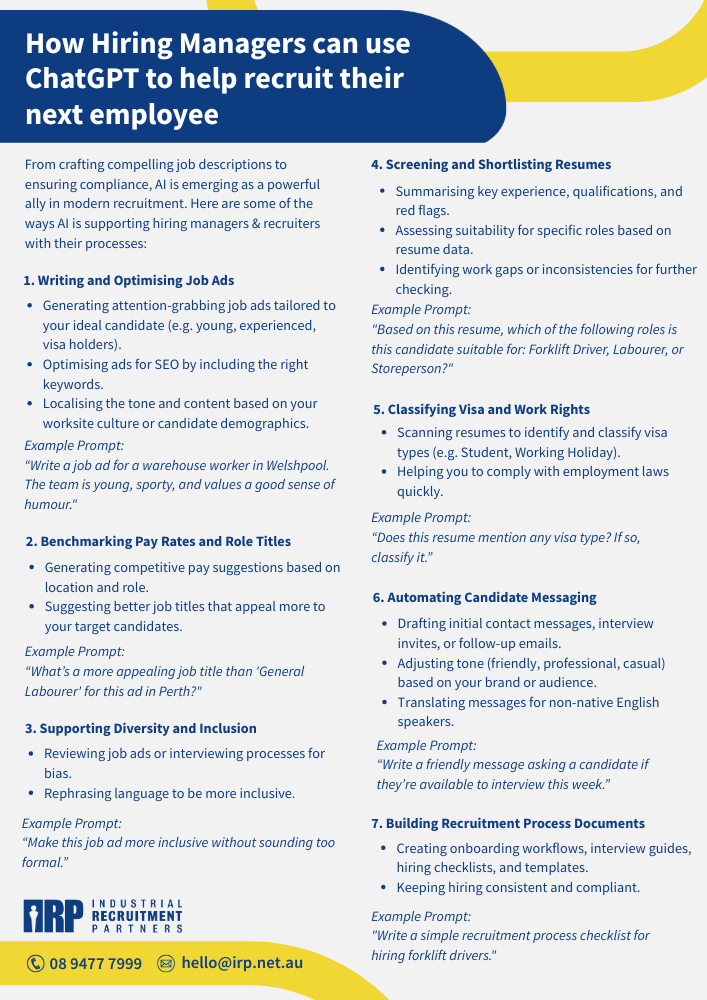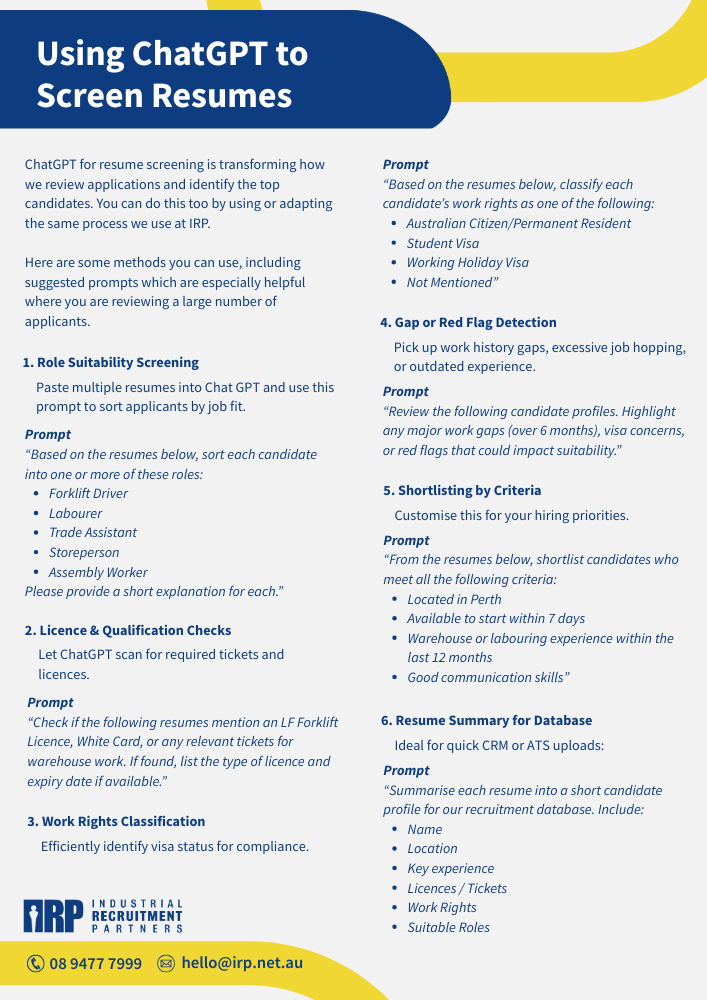Can AI Replace Recruiters?
Can AI Replace Recruiters?
AI is developing faster than you can blink. It has almost limitless applications, constrained only by our imaginations.
It’s fast becoming an invaluable tool across most industries, and the recruitment industry is no exception. The adoption of AI in the recruitment sector is at prolific levels, extending to those in charge of hiring.
I spoke to the Manager of a Caravan manufacturer who had recently used Chat GPT to screen candidates, and the results were exceptional. Using the AI chatbot, around 30 applicants were screened and quickly narrowed down to 8 candidates. On further examination by the Manager, he thought all of them looked great - and it took less than 5 minutes! Even a good recruiter would take at least an hour to sift through those applications.
AI is transforming the recruitment industry – it's an amazing tool and will only get more powerful and effective as the data models become more sophisticated, its functionality offers more capabilities, and we learn how to leverage it to achieve more in less time.
Important Note: AI is not replacing nuanced human interaction anytime soon
As a recruiter with nearly 30 years of experience, AI is incredible, and the most significant advancement I’ve seen in my working career.
For recruiters, AI does (or will do) all the painstaking, monotonous recruitment admin work. It’s amazing at providing instantly usable recruitment tools such as candidate marketing material or interview questions. And it’s far better and faster at it than me, or most recruiters I’ve come across. But that’s where the AI story ends, at least for the time being.
Some in the tech world believe that AI can replace human-led recruiting. But in most cases, running an AI Agent to complete tasks, building an algorithm, or matching a job description to a resume represent components of a more complex, iterative end-to-end recruitment process.
Of all the research, including Chat GPT itself, I am yet to find anything that will replace the nuanced, interpersonal and intuitive approach that a good recruiter or hiring manager offers.
What do good recruiters offer (that AI can’t)?
Strategic Advice
Recruiters provide strategic recruitment and HR advice based on company workforce planning objectives (i.e. diversity and inclusivity gaps across various divisions in an operation), something that AI cannot do without meeting the team in person.
Site Visits
Recruiters can conduct on-site, in-person observations and interact with the Team to assess physical and technical job functions, workforce planning objectives, workplace culture and specific departmental Team culture. This is a crucial step in the recruitment process which affects everything down the line.
Understanding the Team
Recruiters take the time to understand the idiosyncrasies of the workplace and Team itself. They also tend to get a “gut feel” when meeting candidates - although unscientific, a “gut feel” is a real and valuable element in recruitment. These intangibles are vital in understanding unique and hidden characteristics of a candidate, something AI cannot experience.
Evaluating Strengths
Recruiters are good at evaluating Team strengths and weaknesses in technical and skill areas, ensuring that a new Team member adds value and enhances the overall Team performance. It would be very difficult for AI to evaluate a person’s skills without seeing them.
In-depth Interviews
Recruiters conduct interviews to discover how well the candidate has understood the requirements of the job and get to know them on a more personal level. AI can perform some human-centred stages of a recruiting process – for example McDonalds use AI to hire teenage crew members. But in many skilled or semi-skilled blue-collar recruiting processes, interpersonal and face-to-face interviews are still by far the most reliable method of interviewing.
Thorough Reference Checks
Good recruiters go beyond relying on reference check forms. Talking with the candidate’s past manager or direct report allows recruiters to ask job and behaviour specific questions, validate a candidate's actual experience and ask probing follow up questions. AI wouldn’t even have access to a candidate’s past manager, let alone be able to speak with them and ask deeper questions.
Pre-Boarding
Once a candidate accepts an offer, there’s a critical window before their first day, often called the ‘grey zone’, where uncertainty or competing opportunities can derail a hire. Skilled recruiters actively manage this phase by maintaining clear and consistent communication, answering last-minute questions, and providing reassurance about the role and company. They do a good job at keeping the candidate engaged in the role and putting them at ease, something AI would struggle with.
Post-Placement Support
Recruiters provide valuable support during the first 30 days after placement by checking in with both the new employee and their manager. These conversations help surface any early concerns, whether it’s a mismatch in expectations, confusion about responsibilities, or cultural adjustment. By facilitating early intervention, recruiters help new hires settle in, establishing a stronger connection to the role and organisation.
Conclusion
AI tools like ChatGPT are revolutionising recruitment by enhancing efficiency, consistency, and speed across many routine processes. From resume screening to job ad optimisation, they are a powerful ally for modern recruiters and Hiring Managers.
However, the heart of recruitment remains human. The ability to assess culture fit, build relationships, interpret nuance, and support both the candidate and client throughout the journey — from initial interest to post-placement — cannot be replicated by technology alone. The best outcomes come when AI supports recruiters, not replaces them. Combining smart technology with human insight is the future of great hiring.
If you are looking for a Recruitment Partner in Perth to help you find the right people for your team, reach out to IRP today at hello@irp.net.au or give us a call on 08 9477 7999.
Join Our Mailing List
Interested in receiving more content similar to this straight to your inbox each month? Sign up to our mailing list below!













